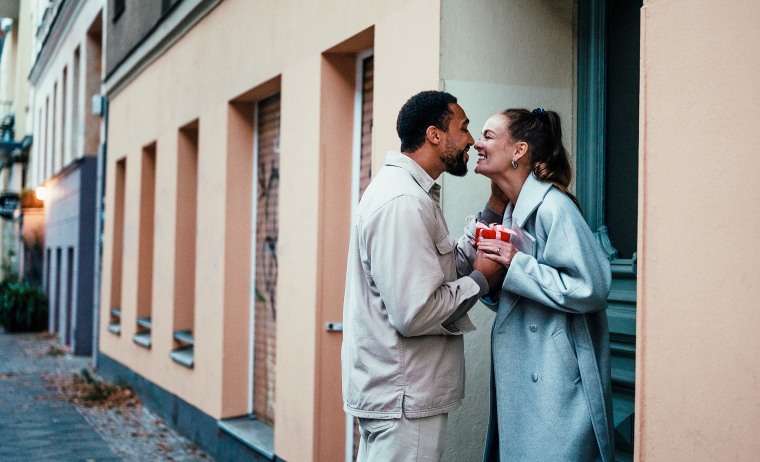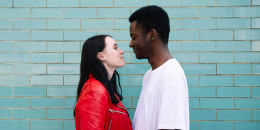It's the age-old question. You've been going out with your special someone for a few months (or weeks? days?) and you're starting to relate to Taylor Swift singing, "You can hear it in the silence, you can hear it on the way home, you can see it with the lights out." You're wondering: How do you know you love someone?
With all of these giddy feelings whirling around in your heart and mind, how can you tell if what you're feeling for your beau is really true love? On the flip side, maybe you've been dating your partner for a long time and aren't sure whether you actually love them or just feel really comfortable with them. Read on to hear from relationship experts about how to pinpoint whether you love someone.
How do I know if I’m in love or just attached?
Thomas Edwards, founder of men's relationship coaching service The Professional Wingman, tells TODAY.com that he believes intense romantic attachment is rooted in questions of "abundance and scarcity."
"When there's a feeling of fear of loss that becomes so overwhelming that you start to behave differently as a result of that in your relationship, that could be the kind of (unhealthy) love that sometimes people kind of confuse as love," Edwards says.
For Dr. Zoe Shaw, a psychotherapist and relationship coach with her own practice in Southern California, attachment may stem from a human desire for companionship, but that true love takes a different, deeper form of investment in the other person.
"You're trying to assuage maybe feelings of loneliness, isolation, or just wanting to have somebody to do things with," Shaw tells TODAY.com regarding attachment. "When you love somebody, you actually begin to consider their needs, not in a 'I want to please you' way, but 'I want what's good for you.' When you love somebody, you are willing to sacrifice things that you may not have been able or willing to sacrifice in another relationship."
She adds that in true love, partners begin to consider and care for each other in the same way they consider themselves.
However, Shaw also emphasized not to confuse this level of care with an unhealthy codependency, in which people pour themselves into their partner and do not care for themselves enough in a relationship.
Infatuation vs. love
Shaw says that people often have a difficult time distinguishing between love and limerence, which is often described as a rush of intense infatuation and desire for the other person during the very early stage in a relationship.
"There's almost an obsessive feeling where you want to please the other person, but often you aren't really who you are," Shaw says. "So it's easy to kind of create a façade and want to be a perfect version of yourself because you have all of these amazing positive feelings, and then you also tend to look at the other person through the rose-colored glasses."
Edwards also distinguished infatuation from love, saying true love goes further than the "puppy dog phase" when initially "you're all over each other and you're obsessed and it's all you can think about."
"You start to think about a future with this person," Edwards says. "You start to think, 'Wow, how I feel about this person is so overwhelmingly big and abundant.' And the idea of living without them doesn't really make sense. Not from a fear standpoint, but just from a sense of a divine connection, if you will, that takes place where you know that if you two were apart, life would totally be different."
What does true love feel like?
To Shaw, some markers of true love can include desiring to introduce a partner to friends and family, becoming deeply curious about them in an "honest and overwhelming" way, and wanting to share parts of oneself with them that haven't been shared with others before.
However, she believes the most important defining factor of true love is that it involves action.
"When you truly love someone, you want to have acts of service, you want to do things that are good for them," Shaw says. "How can you actively show that you love somebody? Usually it's in the things that you do and the way that you speak to them, and being willing to invest and sacrifice and maybe even look at your own personal issues, and being willing to adjust and change in ways that maybe you wouldn't have before."
"In a healthy love, you are conceptualizing yourself as both an 'I' and a 'we.'
Healthy love also must involve being able to conceptualize oneself both as part of a relationship and as an individual.
"I like to think of a Venn diagram where you have this intersecting part that is a 'we,' and then you have these individual parts that are 'I's," Shaw says. "In a healthy love, you are conceptualizing yourself as both an 'I' and a 'we.'"
Edwards says true love, ultimately, is unconditional.
"Knowing that they have your back and they're always supportive," Edwards says. "And your willingness to be their 'ride-or-die,' your willingness to support them no matter what, no matter what they're going through, no matter how they show up each and every day. The ups and downs and the left and right."










